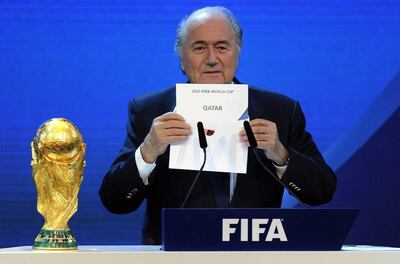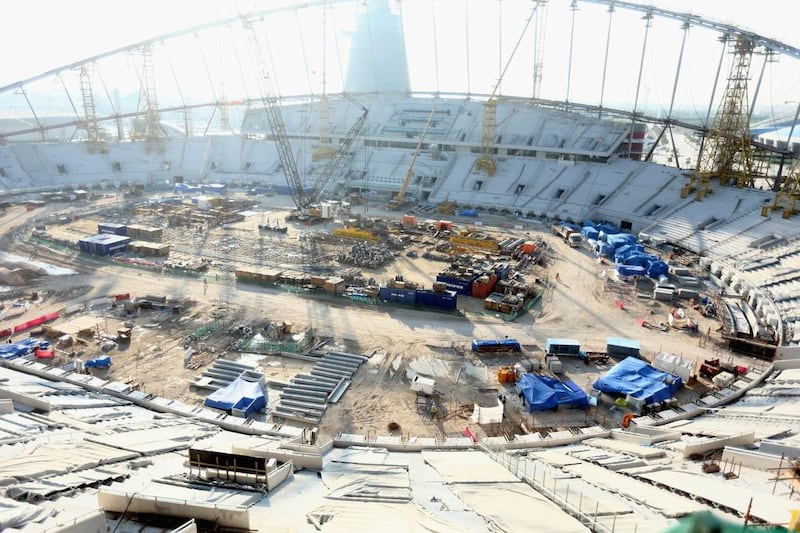Qatar has been hit with damaging new allegations of corruption over its controversial 2022 World Cup bid as a French news website revealed on Sunday that US and Brazilian prosecutors are investigating a suspicious transfer of $22 million (Dh80.80 million) allegedly made by the Gulf nation.
Mediapart reported that the multi million dollar payment had been made from Qatari group Ghanim Bin Saad Al Saad & Sons Group (CSSG) to the bank account of the Brazilian Football Federation’s former chairman Ricardo Teixeira in January 2011, one month after Qatar was awarded the international tournament.
The discovery was made by the Brazilian justice ministry and the FBI who were investigating bank statements of Mr Teixeira from an account he had opened at a Swiss-based facility called Pasche Monaco, controlled by Credit Mutuel.
The website said that the CSSG, "led by businessman Ghanim Bin Saad Al Saad, is at the heart of suspicions of corruption”.
Mr Teixeira resigned from his role at the Brazilian Football Federation in 2012, having been dogged by allegations of money laundering and fraud throughout his 23-year tenure as boss.
_______________
Read more:
[ Fifa official took $1m bribe for Qatar's World Cup vote, court hears ]
[ Football officials on trial in New York over corruption charges ]
[ Swiss prosecutors grill PSG’s Al Khelaifi over World Cup bribery claims ]
_______________
The 70-year-old, who was the ex-son-in-law of former FIFA president João Havelange, was one of the 22 members of the Executive Committee of FIFA, which selected Qatar in December 2010 as hosts of the World Cup.
The report alleges that Mr Teixeira was the middleman and had been planning to make deposits to fellow FIFA officials, Jack Warner, Nicolas Leoz and Mohamed Bin Hammam, who voted for the tournament to be held in Qatar.
Mediapart added: "In early 2013, several transfers were in effect, issued the same day from his account, to Jack Warner who was then president of the Confederation of football North America, Central America and the Caribbean], as well as Mohamed Bin Hammam, President of the Confederation of Asian Football and Nicolas Leoz, President of the Confederation of South America.”
Qatari businessman Ghanim Bin Saad Al Saad has previously been investigated by prosecutors over deals which he oversaw in France, one of the key backers of the Qatari bid.
In August this year, British newspaper Daily Telegraph claimed that investigators were trying to trace a payment of 182m euros made during a deal with Mr Al Saad, which was suspected of being used to pay off World Cup officials.

The allegation that Mr Teixeira handled Qatari payments in exchange for World Cup votes is the latest in a scandal that has engulfed Doha’s attempt to host the most prestigious football tournament in the world.
Three former South American football officials are currently on trial accused of being involved in a £120m bribery scheme, related to broadcasting and hosting rights for football tournaments.
During a dramatic day in a court in New York this month, a witness claimed that Julio Grondona, the former president of the Argentine Football Association who died in 2014, had demanded $1 million to secure his backing for Qatar’s World Cup bid.
Out of 25 FIFA executives involved in backing Qatar 2022 and Russia’s 2018 World Cup campaign, which has also been mired in controversy, 13 have been ousted or deemed “demonstrably corrupt”, according to the Guardian newspaper.
The corruption scandal as well as concerns raised by the international community over the welfare of workers’ rights, the start of the tournament being moved from June to November to avoid the soaring summer temperatures and the ongoing boycott by GCC countries, has led for calls for Qatar to lose its right to host the World Cup.
In 2015, Domenico Scala, the head of FIFA's Audit And Compliance Committee said that if evidence surfaced that Qatar had won the competition because of “bought votes, then the awards could be cancelled".
While in October this year a report obtained by the BBC revealed that private discussions by Western diplomats had questioned whether the tournament, which would be the first World Cup in the Middle East, would take place at all.
The report, carried out by management company Cornerstone Global, found that the political crisis which led to the UAE, Saudi Arabia, Bahrain and Egypt cutting ties with Doha was putting the tournament at risk of being moved to another nation.






